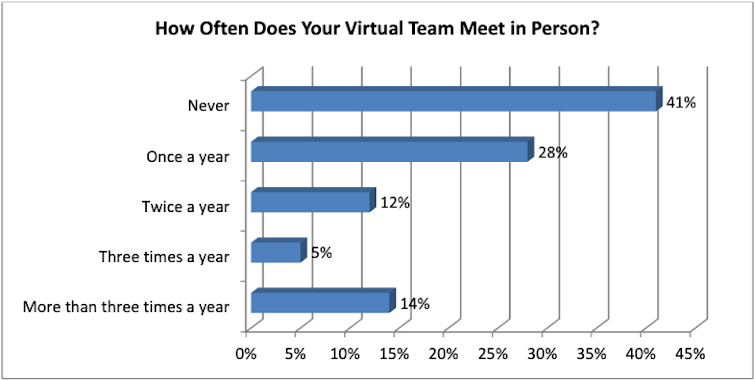Anne Bartel-RadicProfessor of Management Sciences at Sciences Po Grenoble and at the CERAG laboratory
With the Covid-19 crisis, telecommuting - once an occasional occurrence - has become the norm for many employees and managers. International teams have always been unique in that they work remotely, with each team member linked to the others via digital tools. Yet the health crisis, with all the mobility constraints it poses, seems to be affecting them too.
Already virtual teams
Globalization has led to the emergence of specific managerial issues how to manage teams whose members are based in different in different countries? What management style should be to work with people from different cultures? cultures?
The emergence and widespread use of communication tools such as e-mail, videoconferencing and the cloud have provided a partial answer to the first question. These tools have greatly facilitated international collaboration, through the progressive virtualization of management and team communication. As a result, virtual international teams have become commonplace in businesses, international organizations and research since the 2000s.

A survey in 2016 showed that work teams in multinational companies had thus become almost entirely virtual: 48% of those surveyed said that more than half their team members were located in other countries (compared with 33% in 2012). 41% of those involved in international teams had never met the other members of their team in person. The Covid-19 crisis, which drastically limits international travel, could well increase this last figure in the future.
If new technologies make it easier to manage international international teams by limiting the constraints of time and space. space, they do not break down the barriers of intercultural communication and intercultural communication and understanding.
Intercultural competence: a key performance factor
The fact that international teams are confined to their own countries, and are therefore unable to go abroad to meet others, is a real brake on the development of intercultural competence, the ability to understand and adapt to the specificities of intercultural interactions.
Intercultural competence is a key skill in international companies and organizations. It is seen as an important criterion for the adaptation of international or expatriate executives, as necessary for successful interactions within a single multinational company, and as one of the key factors in the performance of intercultural team leaders.

Research I've carried out shows that international experience is essential for the development of intercultural skills, and that a first trip abroad represents a threshold effect in this learning process.
The impoverishment of exchanges by digital tools does not necessarily allow for cultural awareness, which is the first step in multicultural learning. Videoconferencing leaves no room for gestures, telephoning or remote conferencing without images eliminates mimicry, and the written word takes away the intonations in the voice...
The risk of a vicious circle
Media richness theory indicates that, in culturally diverse teams, certain types of message (related to knowledge sharing) require more than virtual interactions to be properly conveyed. Rich" means of communication based on face-to-face physical exchanges are needed. Global containment and the reduction of communication within multicultural teams to digital alone will therefore add complexity to complexity.
It's thanks to these "real" encounters and a shared context that team members get to know and appreciate each other. These positive emotions create mutual trust and team cohesion, which are essential for successful collaboration. They are fundamental to overcoming difficulties and dealing constructively with conflict.
And if cohesion is no longer present in these teams, they risk entering a vicious circle: in difficult, tense and uncertain times, the characteristics of our culture come to the fore, as they appear to us all the more because in times of crisis, they appear to us all the more as the right way to work and communicate. Cultural differences within within the team are reinforced.
At the same time, we're less willing to compromise in order to adapt pressure and perceived difficulties. In other words, team members' intercultural skills are much less are used to a much lesser extent - which only serves to reinforce tensions and conflicts within the team, which in turn accentuates cultural differences, and so on.
Remote collaboration largely eliminates informal exchanges informal exchanges, moments when team members get to know each other and ideally get to know and ideally appreciate each other over a coffee, a meal, or a shared shared activity.
So how do you keep international teams running smoothly in times of great uncertainty? With the confinement and telecommuting of teams who previously worked in shared premises, many companies have set up informal virtual exchanges such as "video cafés".

What's more, two-thirds of respondents to a recent survey by the French agency for the improvement of working conditions (ANACT) claim to benefit from an exchange with their manager at least once a week. However, this phenomenon is more prevalent among teams who have recently overhauled their working methods. We can assume that international teams who were already used to working remotely seem not to have changed their habits.
It is therefore crucial to invent new management methods. While getting to know others better is enriching in itself, it remains an essential skill for working in an international team.
This analysis was originally published on The Conversation on May 12, 2020.